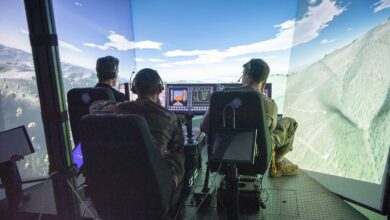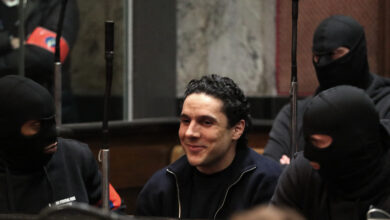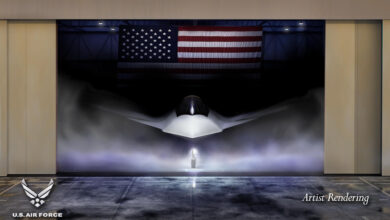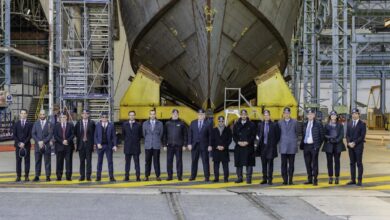France will give its former colony Central African Republic weapons and €24 million ($27.4 million) in aid, Foreign Minister Jean-Yves Le Drian announced on Friday, November 2.
“France wishes to continue its historical partnership with the Central African Republic,” the minister told journalists in Bangui after meeting President Faustin-Archange Touadera.
Le Drian, who was on a two-day visit to the country, signed aid agreements worth €24 million in 2018 for the payment of salaries and pension arrears, to develop regions near neighbour Cameroon affected by massive population displacements, and build bridges to open access to parts of the country.
He also announced that France would “soon deliver arms” – specifically 1,400 assault rifles – for the Central African Armed Forces (FACA), AFP reported.
“We are doing this within the strict, respectful, and transparent framework of the United Nations, in total transparency concerning the origin, the routing, and the delivery” of the arms, Le Drian said.
“It would be absurd to train soldiers and not to give them the means to perform their duties,” he added.
“We are working to ensure that the Central African Republic regains its sovereign rights,” CAR’s foreign minister Charles-Armel Doubane said, RFI reported.
Doubane said it is “time for France to make available to FACA, within the strict framework of international commitments … these assault rifles, and we are delighted,” TV5 Monde reported.
CAR arms imports and geo-political squabbles
Thousands of people have died in CAR, 700,000 have been internally displaced and another 570,000 have fled abroad in fighting since 2013, when the Seleka coalition of mainly Muslim rebel groups toppled longtime leader Francois Bozize, a Christian, who himself seized power in a coup.
Seleka was officially disbanded within months, but many fighters refused to disarm, becoming known as ex-Seleka. Many others joined the mainly Christian anti-Balaka militia to fight the Seleka, leading to a spiral of violence between groups along both religious and ethnic lines.
Touadera’s weak government controls around a fifth of the country and relies heavily on the United Nations peacekeeping mission Minusca for support. The rest is controlled by at least 14 different militia groups who often fight each other for control of revenue from extortion, roadblocks or mineral resources.
The U.N. Security Council imposed an arms embargo in 2013 and in January unanimously extended its sanctions against CAR until January 31, 2019, but weapons shipments for the security forces can be approved with special pre-approval by a sanctions committee.
The embargo was last year lifted by the Security Council to allow delivery of Russian weapons for CAR’s armed forces. The United Nations has verified, with the defense ministry and Russia, weapons deliveries from Russia.
Russian advisors work with the CAR’s military and provide security and advice to Touadera. Moscow also recently signed a military cooperation agreement with CAR offering the possibility for Central African officers and NCOs to be trained in Russian military schools.
The European Union also has a training mission in the CAR, and in July the bloc the extended EUTM-RCA until 2020, pledging €25 million ($29 million) to help reform the country’s defense sector. The scope of the mission has also been modified to give strategic advice to the president’s cabinet, interior ministry and police, as well as the military.
Russia’s Ambassador to CAR Sergey Lebanov said on September 17 that a second shipment of Russian arms and ammunition “is in preparation,” and will be delivered once it has been approved by the U.N. Security Council.
In June, France, the United States and the United Kingdom put a hold on a request from Central African Republic for U.N. Security Council approval of weapons shipments from China.
Also in June, the E.U.’s diplomatic chief Federica Mogherini proposed a new €10.5 billion ($12.4 billion) “peace facility” that could pay for military equipment, including lethal weaponry, for partner countries in crisis zones such as the Central African Republic and Africa’s Sahel region.
In September, Parfait Onanga-Anyanga, the U.N. special envoy to the CAR, said that the need for weapons was “undeniable” as the Central African Republic government builds its armed forces, but urged transparency in the flow of arms.
“China, but also the United States, have proposed new quantities of weapons,” Onanga-Anyanga said. “It’s for a good reason.”
Onanga-Anyanga’s came after Touadera reiterated a call for “the total lifting of the arms embargo that still weighs on our national army” in an address to the annual U.N. General Assembly.
France, Belgium, China and the U.S. have recently supplied equipment for CAR’s military, but that equipment is understood not to include weaponry.
With reporting from AFP












